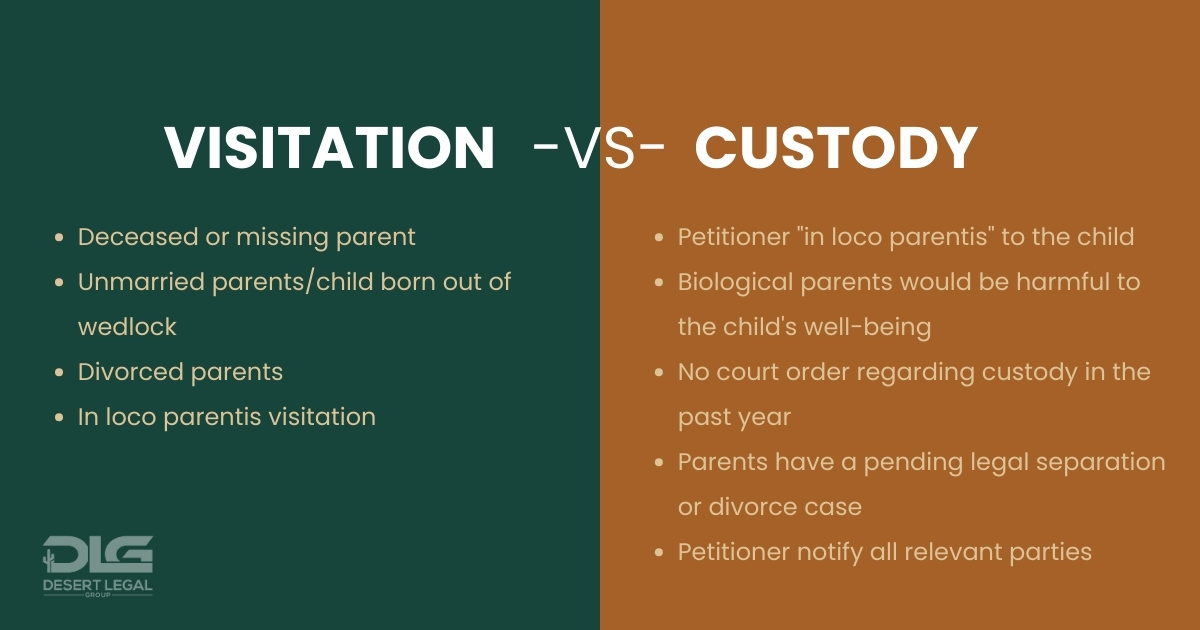Understanding your rights as a grandparent can be a complex process. Seeking them can seem downright impossible if you’re navigating a strained relationship with your child or their spouse. At Desert Legal Group, our family law attorneys are pleased to be your advocate for maintaining a strong bond with your grandchildren.
We understand the unique connection between grandparent and grandchild and strive to ensure you have the information you need to keep this connection thriving. Explore the intricacies surrounding grandparental rights in Arizona, including your visitation and custody possibilities.
Facts About Grandparental Rights
Securing a lasting bond with grandchildren enriches the lives of grandparents and grandchildren alike, but when family dynamics shift, this bond can be at risk. Arizona law recognizes the importance of grandparental rights when it comes to visitation and custody if necessary. However, the law does take some measures to promote legal parents’ right to serve their child’s needs when possible.
The state prioritizes the rights of legal parents, so grandparents must demonstrate a compelling case when seeking court-ordered visitation or custody. Understanding the different aspects of Arizona’s stance on grandparental rights can empower you to make informed decisions regarding pursuing those rights in court.
Petitioning For Custody or Visitation

Grandparents and other non-parents have legal standing in Arizona to petition the court for visitation or custody, though it is not always granted. Someone other than a biological or legal parent can petition the court for custody or visitation rights, and must meet specific qualifications to achieve a court order. Certain conditions must also apply to the child’s biological parents. Due to the serious nature of a court-ordered visitation or custody ruling, these qualifications and conditions are rather complex.
To get a court to order visitation in Arizona, the court must determine that visitation with that party (whether grandparent or someone else) is in the child’s best interest.
Additionally, other grounds for grandparental visitation must be met and include:
- Deceased or missing parent – A legal parent is missing if someone reports them to a law enforcement agency as missing, and no one has determined their location for three months.
- Unmarried parents/child born out of wedlock – The court may assign visitation rights to a grandparent if the child was born out of wedlock. The parents must have been unmarried when the party filed the petition.
- Divorced parents – The court may consider grandparent or great-grandparent visitation if the legal parents have divorced. The marriage must have dissolved at least three months ago.
- In loco parentis visitation – A third party acting as a parental figure may be considered, as well. A dissolution of marriage proceeding or legal separation petition must be pending when the third party files the petition.
Grandparental Custody Rights
Arizona places high importance on a child remaining in the care of their biological or legal parents when possible. Petitioning for custody of a grandchild comes with more stringent requirements than visitation rights.
These requirements are:
- The petitioner must have acted as a parental figure or “in loco parentis” to the child.
- The court must determine that the child remaining with either biological or legal parents would be harmful to the child’s well-being.
- There has not been a court order regarding custody or parenting time in the past year. An exception is if the child is in danger physically, mentally, morally, or emotionally.
- The parents must have a pending legal separation or divorce case, or the child must have a deceased biological parent or have been born out of wedlock.
- The petition must include details and proof supporting any claims.
- The petitioner must notify all relevant parties, including biological or legal parents, guardians, or anyone pertinent.
Other Factors Influencing a Court’s Decision

As you can see, Arizona law has stringent requirements when ordering visitation or custody. A judge may consider additional factors, including the child’s relationship with the individual, the individual’s motivations, the impact of the visitation on the child’s routine, and the importance of maintaining possible extended family relationships. If the child already spends time with the grandparent through a parent, courts may order visitation if practical and appropriate.
Any visitation previously decided will be terminated if and when someone adopts the child, or someone places the child up for adoption. If a child is removed from their adoptive placement, a court may reinstate visitation rights. This information does not apply when a spouse of a biological parent adopts the child after the biological parent remarries.
Keep in mind that grandparents should petition for visitation or custody in the same court where the parents decided custody or visitation before, if relevant or possible.
Joint Legal Decision-Making Authority
In most cases, it is highly improbable that a court will grant grandparents joint legal decision-making authority with parents. Typically, the grandparent must adopt or have legal custody of the grandchild to be granted this authority, which is usually reserved for legal parents.
Removal from Dangerous Environment
A grandchild in immediate danger of physical, mental, moral, or emotional harm in their current environment deserves immediate action. A grandparent can seek an emergency removal order and should seek legal counsel.
Legal Process for Grandparental Rights
Navigating through the legal process for grandparental rights can be difficult. Seeking guidance through a knowledgeable law firm is highly recommended.
An experienced team of attorneys can help:
- Petition the court for visitation or custody
- Draft a desired visitation schedule or custody arrangement
- Gather evidence to support a case
- Negotiate with applicable parties or
- Represent an individual in court, if necessary.
Scheduling Grandparental Visitation

An informal or court-mandated visitation schedule helps a child maintain a routine. When reviewing a visitation schedule, a court will consider the child’s best interest, reasonable visitation time, and whether the grandparent should be supervised.
Grandchild’s Best Interest
Arizona courts prioritize a child’s best interest in all matters regarding visitation or custody. Courts consider factors like the child’s age, school schedule, existing relationships with parents and grandparents, and emotional well-being. For example, a younger child may benefit from frequent, shorter visits, while an older child might need longer, less frequent visits.
Reasonable Time
A court determines a reasonable visitation time based on a child’s needs and a grandparent’s abilities and circumstances. For example, grandparents may want a more extended visit with their grandchild. However, due to the child’s other routine activities, this may not be possible or beneficial to the child.
Supervised Grandparent Visitation
Sometimes, a court may order grandparent visitation accompanied by a neutral third party. This may be the case when parents or other individuals raise concerns about the ability of the grandparents to care for the child on their own or the safety of the child in the situation.
Importance of Grandparental Rights
Grandparents often play a crucial role in their grandchildren’s lives. They can provide emotional support, stability, cultural connection, and childcare. Some believe that a positive grandparent-grandchild relationship can benefit a child’s development.
Role of Grandparents
Grandparents typically play a separate but essential role in a child’s life compared to a parent. Not being the child’s biological parent can mean that a grandparent can provide children with a unique perspective, a sense of security and belonging, love, and affection, especially during challenging family situations.
Maintaining a positive relationship with grandparents can benefit a child’s emotional well-being and development. A positive relationship with a grandchild can also provide a sense of purpose and increase a grandparent’s emotional and physical well-being.
Potential Drawbacks of Grandparent Overreach
Positive grandparent-grandchild relationships can be meaningful for both individuals’ growth. Despite this, there can be times when perceived overreach or overinvolvement can strain the parent-child or grandparent-parent relationship. Each pairing in a family is vital to harmony and should be respected.
When parents wish to limit contact, it can be essential to respect the boundaries a parent puts up or, at least, seek to understand why the parent feels the way they do. In particular, if there is a history of abuse or painful feelings, or when an ongoing conflict exists between grandparent and parent, it can make sense to tread lightly and have an open dialogue about intent in hopes of giving the relationship time to mend. The resulting strain on the child can make it difficult for all parties involved to maintain a positive relationship..
Mediation and Collaboration
In general, if a grandparent’s relationship with their child seems too difficult to mend, but the grandparent desires a positive relationship with their grandchildren, the grandparent should consider seeking legal advice. A compassionate attorney might recommend mediation between the parties to foster relationship repair.
Parties should seek an agreement regarding grandparent visitation whenever possible. While some families come to this agreement informally, there are times when parties may need to seek more formal routes. With mediation or collaboration, litigation is not always necessary. When grandparents and parents attend mediation sessions to resolve visitation and custody disputes, a neutral, third-party mediator can help guide the conversation and ensure a mutually agreeable outcome.
These sessions help everyone involved reach a better agreement and gain vital communication skills for the future. Attending meetings with a mediator can minimize conflict and prioritize a child’s well-being.
FAQs about Grandparental Rights in Arizona

Here are some commonly asked questions about grandparents’ rights in AZ:
Your Grandparental Rights Attorneys

Grandparent-grandchild relationships are essential in many families. The familial relationships a child has influence their well-being. At Desert Legal Group, we understand the complexities of dealing with grandparental rights disputes in Arizona. Our attorneys have experience advocating for grandparents’ rights and helping Arizona grandparents do what is necessary for their grandchildren.
Contact us for a consultation when you need someone to help you maintain a positive bond with your grandchildren. We can discuss your situation, and help you find the right option for your unique situation whether through mediation, collaboration, or litigation.
*Editor’s Note: This article was originally published and has been updated April 8, 2024.

Attorney Cory Keith is an exceptional legal professional dedicated to providing effective representation for his clients. Driven by the belief in treating others how he would want himself represented, Mr. Keith has earned a name for himself for his unflagging advocacy and compassionate approach to law.
Mr. Keith attended Arizona State University, earning his Bachelor’s in Criminal Justice and Criminology through a full academic scholarship. With outstanding performance, he received another full ride academic scholarship to attend law school, where he demonstrated exceptional leadership abilities by accepting executive roles in various organizations as well as serving as legal clerk at multiple well-respected law firms.
